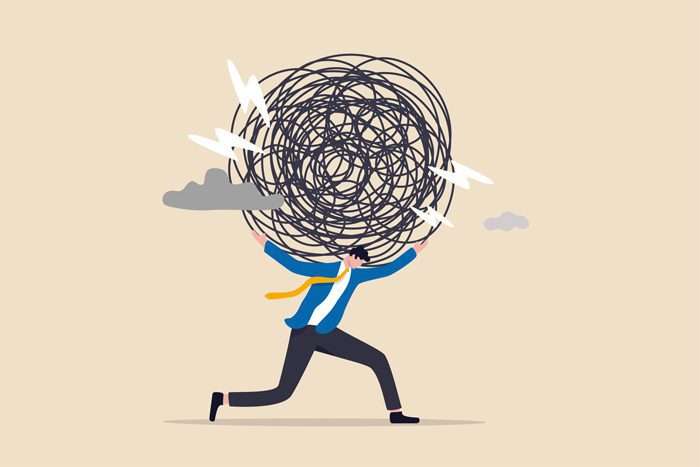Obesity is a complex health condition influenced by genetics, environment, and lifestyle factors. However, its challenges extend beyond physical health.
Social stigma associated with obesity—manifesting as discrimination, stereotypes, and bias—creates significant psychological distress.
This stigma often leads to anxiety, exacerbating the mental health burden for individuals with obesity.
In this article, LeanAndFit will explore the mechanisms through which social stigma triggers anxiety, supported by scientific evidence and real-life examples.
By understanding the depth of this issue, we can foster greater empathy and awareness in society.
Article Index:
- Introduction to Obesity-Related Social Stigma
- How Stigma Manifests in Daily Life
- Psychological Mechanisms Linking Stigma to Anxiety
- The Role of Media in Perpetuating Stigma
- Real-Life Examples of Stigma-Induced Anxiety
- Scientific Studies on Social Stigma and Anxiety
- FAQs on Social Stigma, Anxiety and Obesity
- Conclusion: Addressing the Psychological Toll of Obesity Stigma
Introduction to Obesity-Related Social Stigma
Social stigma surrounding obesity stems from deeply ingrained stereotypes that label individuals with obesity as lazy, undisciplined, or lacking willpower.
These harmful assumptions permeate various aspects of life, leading to discrimination in workplaces, healthcare settings, and social interactions.
Weight-based discrimination not only isolates individuals socially but also inflicts psychological harm.
A study published in Obesity Reviews (2010) highlights that weight bias impacts individuals across all demographics, exacerbating feelings of inadequacy, loneliness, and mental distress.
For people with obesity, the stigma extends beyond external judgment to internalized criticism. Many adopt society’s negative perceptions, leading to self-blame and heightened anxiety.
This internalization perpetuates a cycle of low self-esteem and social withdrawal, making it even harder to address weight-related challenges.
The pervasive nature of obesity stigma underscores the urgent need for societal change, emphasizing empathy and understanding over judgment to mitigate its damaging effects on mental health and well-being.
How Stigma Manifests in Daily Life?
Social stigma against obesity can appear in various forms, including:
- Workplace Discrimination: Employees with obesity may face bias in hiring, promotions, and workplace interactions. A 2016 study in The International Journal of Obesity found that weight-based discrimination was more common than discrimination based on race or gender in professional settings.
- Healthcare Bias: Patients with obesity often report feeling judged or dismissed by healthcare providers, leading to delays in seeking medical care. This can result in worse health outcomes and heightened anxiety.
- Social Exclusion: Individuals with obesity frequently encounter teasing, bullying, or exclusion in social settings, further contributing to feelings of inadequacy and stress.
Example: Emma, a 35-year-old teacher, shared her experience of being overlooked for a leadership role despite her qualifications. She attributed this to her weight, which fueled her anxiety about professional growth.

Psychological Mechanisms Linking Stigma to Anxiety
The psychological impact of obesity stigma is profound, and several mechanisms explain its link to anxiety:
- Internalized Stigma: When individuals adopt societal stereotypes about their weight, they develop body image issues, exacerbating feelings of shame and self-doubt.
- Hypervigilance: Experiencing stigma makes individuals hyper-aware of potential judgment, leading to constant stress and social anxiety.
- Avoidance Behaviors: To escape judgment, people with obesity may withdraw from social interactions, leading to isolation and worsening mental health.
A 2018 study in Health Psychology found that internalized weight stigma was strongly associated with generalized anxiety disorder (GAD), highlighting the cyclical relationship between societal attitudes and individual mental health.
Example: Mark, a 28-year-old software engineer, avoided team lunches and social gatherings due to fear of judgment about his weight. This avoidance increased his anxiety and strained workplace relationships.
The Role of Media in Perpetuating Stigma
Media plays a significant role in reinforcing negative stereotypes about obesity, shaping societal attitudes and self-image in detrimental ways.
Advertisements often promote unrealistic body standards, while television and movies frequently ridicule overweight characters, framing them as comedic relief or symbols of laziness.
Such portrayals marginalize diverse body types and perpetuate harmful stereotypes that contribute to body dissatisfaction.
- Unrealistic Body Ideals: Social media platforms glorify slimness, often showcasing heavily curated images that set unattainable standards. A 2020 study published in Body Image found that exposure to idealized body images significantly increased anxiety and body dissatisfaction among individuals with obesity.
- Negative Portrayals: Overweight characters are seldom portrayed in empowering roles, which reinforces societal bias and limits the representation of body diversity in media.
Example:
Sarah, a 22-year-old college student, experienced heightened anxiety after scrolling through social media feeds filled with fitness influencers.
The constant comparison to these idealized images intensified her feelings of inadequacy, diminishing her self-esteem and mental well-being.
John’s Workplace Struggles:
John, a 40-year-old manager, encountered subtle but persistent biases from his colleagues, who questioned his capability to lead effectively because of his weight.
Despite his proven track record and leadership skills, these unfounded perceptions began to take a toll on his self-confidence.
John internalized these judgments, becoming overly self-critical and doubting his own abilities.
This ongoing scrutiny created a sense of insecurity, triggering significant anxiety about his job performance.
The pressure to constantly prove himself not only affected his mental well-being but also strained his ability to focus, ultimately impacting his workplace productivity and overall satisfaction with his role.
Maria’s Healthcare Avoidance:
Maria, a 50-year-old woman, repeatedly delayed visiting her doctor because of prior experiences with weight-shaming during medical appointments.
These negative encounters left her feeling judged and unwelcome, causing her to avoid seeking necessary care.
As a result, her untreated health issues worsened over time, intensifying her physical discomfort and creating additional anxiety about future medical visits.
This avoidance behavior trapped her in a vicious cycle, where her declining health further increased her apprehension, making it even harder for her to seek the help she needed.
Maria’s experience highlights the damaging impact of stigma on both mental and physical well-being.
Kevin’s Social Isolation:
Kevin, a 19-year-old college student, decided to stop attending campus events after being publicly teased about his weight at a party.
The humiliating experience deeply affected his self-esteem, hormone induced depression, leaving him feeling unwelcome and judged by his peers.
As he withdrew from social activities, his isolation grew, intensifying his feelings of anxiety and loneliness.
Without the support of a social network, Kevin struggled to build meaningful connections, further exacerbating his mental health challenges.
His experience highlights how social stigma can drive individuals into isolation, significantly impacting their emotional well-being and overall college experience.
How Science Backs Social Stigma and Anxiety?
- Puhl and Heuer (2009): Published in The American Journal of Public Health, this study highlighted the prevalence of weight bias and its association with psychological distress, including anxiety and depression.
- Tomiyama et al. (2014): A study in Psychological Science demonstrated that perceived weight discrimination directly contributed to increased cortisol levels, a biological marker of stress.
- Pearl et al. (2017): Research in Obesity emphasized the role of internalized weight stigma in exacerbating anxiety disorders, underscoring the need for societal change.
These studies collectively emphasize that obesity stigma is not a benign societal attitude but a significant mental health concern.
FAQs on Social Stigma, Anxiety and Obesity
Q-1: What biological chain turns weight stigma into anxiety symptoms?
A-1: Being judged for body size is a “social-evaluative threat” that flips on the stress response—cortisol rises, heart rate jumps, and attention locks onto potential criticism. When this happens repeatedly (comments, stares, jokes), the brain’s alarm circuits become hypersensitive. Over time, even neutral situations feel risky, fueling worry, hypervigilance, and avoidance—classic features of anxiety.
Q-2: Why can routine medical visits trigger outsized anxiety for people with obesity?
A-2: Clinics often spotlight weight—mandatory weigh-ins, equipment that doesn’t fit, unsolicited dieting advice. If you’ve had shaming encounters before, your body anticipates threat the moment the appointment is booked. That anticipation can raise blood pressure and tension in the waiting room, make it harder to speak up, and encourage postponing care—reinforcing a cycle of anxiety and avoidance.
Q-3: How does internalized weight bias make anxiety worse than external stigma alone?
A-3: When cultural stereotypes (“lazy,” “undisciplined”) get turned inward, self-criticism becomes the background soundtrack. That self-talk magnifies everyday stressors—trying new classes, meeting colleagues, even shopping for clothes—because setbacks feel like proof of the stereotype. The result is heightened baseline anxiety, lower self-efficacy, and a tendency to withdraw from opportunities that might actually improve well-being.
Q-4: Are there immediate, measurable stress effects from subtle weight-related cues?
A-4: Yes. Brief exposure to weight-focused comments, “before–after” ads, or tight seating can spark quick physiological jolts—faster pulse, shallow breathing, tension in the neck and jaw. These micro-stresses stack up across a day and teach the brain to expect harm in gyms, public transit, waiting rooms, and social events, which entrenches anticipatory anxiety.
Q-5: What practical steps lower stigma-linked anxiety without making weight loss the goal?
A-5: Tackle environment and skills together.
-
Environment: Choose size-inclusive clinics, advocate for sturdy seating and accessible equipment, and bring a support person to appointments.
-
Skills: Practice brief reappraisal (“My body is not a problem to solve in five minutes”), pair slow nasal breathing with a longer exhale, and use “opposite action” exposures—short, planned visits to spaces you’ve avoided (a five-minute gym walk-through, then leave).
-
Boundaries: Prepare one-line responses to intrusive comments (“I’m not discussing my body today”) and change the subject.
-
Community: Join groups that center ability, comfort, or joyful movement rather than weight—walking clubs, dance classes with flexible pacing, or online forums with moderation policies.
-
Tracking: Log two metrics weekly—situational anxiety (0–10) and participation (times you showed up despite nerves). Seeing upward participation with steady or falling anxiety reinforces progress and reduces the power of stigma over time.

Addressing the Psychological Toll of Obesity Stigma
Social stigma against obesity is a pervasive issue with profound and far-reaching psychological consequences.
It manifests in various forms, including discrimination, internalized stereotypes, and societal pressures, all of which significantly impact the mental health of individuals with obesity.
This stigma often fuels anxiety, affecting multiple aspects of life—from professional growth and academic performance to personal relationships and overall well-being.
Discriminatory experiences in workplaces, healthcare settings, and social environments contribute to feelings of inadequacy and self-doubt, perpetuating a cycle of stress and low self-esteem.
Internalized stereotypes further compound the problem, leading individuals to view themselves through the lens of societal prejudice.
Scientific studies, such as those by Puhl and Heuer (2009) in The American Journal of Public Health, underscore the psychological toll of weight-based stigma.
Real-life examples reveal the daily struggles faced by those subjected to such biases, highlighting the urgent need for societal awareness and targeted interventions to mitigate these harmful effects.
References: